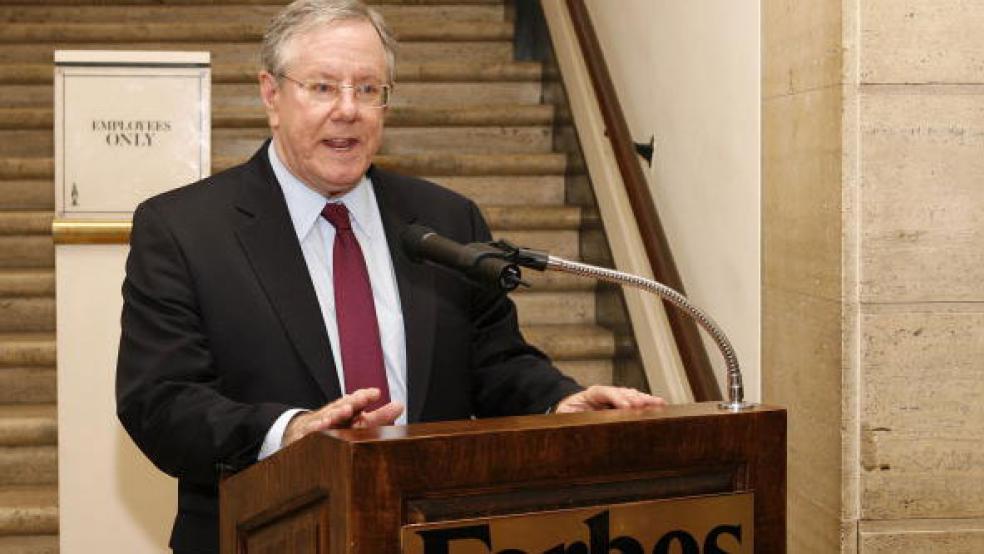Steve Forbes – publisher of Forbes magazine and two-time seeker of the Republican presidential nomination – isn’t wavering from GOP orthodoxy and his party’s take on President Obama.
- What to do about a $1.4 trillion deficit? Make the Bush tax cuts permanent, which he insists will lead to faster economic growth and higher revenues.
- What does he think of the 2,300-page financial reform law that President Obama signed? Scrap it, he says. The only useful parts could have been covered in a few pages.
- What should the government do about the BP oil spill? Get government bureaucrats out of the way.
More than a decade after Forbes made his last run for the GOP presidential nomination, he remains a purist on party economic views that were refined throughout the Reagan era. Tax increases are bad, no matter how big the deficit. Regulations are bad, no matter how big the financial crisis. In a recent telephone interview, Forbes left little doubt that he would be fighting side by side with GOP leaders to block Democratic initiatives on almost every front.
On Taxes
“The best deficit fighter, in addition to having a stable dollar, would be not raising taxes,’’ he said. “That would get the economy going again, which means more government revenues.”
If that sounds like a healthy dose of Reagan-era supply-side, Forbes doesn’t care. He said it would be a huge mistake to let any of the Bush tax cuts expire at the end of this year. President Obama would extend former President George W. Bush’s tax cuts of 2001 and 2003 for families with incomes below $250,000, but he would let the tax cuts for higher-income earners expire at the end of this year. For people in the top tax bracket, individual rates would jump from 35 percent to 39.6 percent.
“Tax increases are not good any way, but at times like this it’s particularly pernicious,’’ Forbes said. Given that armies of small business owners report profits on their individual tax returns, he said, the higher tax rates would amount to a new tax on entrepreneurs. “You not only hurt the creation of capital but you also hurt small and medium-sized companies that are taxed at personal rates,’’ he said.
On Spending Cuts
What spending would he cut right now to reduce deficits? Forbes said he would stop President Obama’s stimulus program and hold onto any money that hasn’t yet been spent. He would do the same thing for the Troubled Asset Relief Program that was created to bail out the financial system. As it happens, Congress and the Obama administration agreed to end the TARP program as part of the financial overhaul legislation.
But Forbes wouldn’t stop there. Sounding as populist as a Tea Party activist, he said he would reduce or shut down the Department of Education and let states use the money themselves. He would revisit Bush’s ill-fated plan to at least partially replace Social Security with private retirement accounts. He would also coax more savings out of Medicare.
On Financial Regulation
Forbes had almost nothing good to say about Obama’s financial reform legislation. “It doesn’t address most of the things that caused the financial crisis,’’ he complained. “Instead, you have a bill that is lengthy and voluminous but also vaguely written. It gives bureaucracies huge amounts of discretion. So people don’t know what the rules of the game are. It’s a crusher for community banks. They’re going to have scores of forms that they have to fill out. It’s going to hurt innovation.”
As it happens, the powerful lobbying group for community banks quietly supported the financial overhaul bill. The law excludes them from being directly supervised by the new Consumer Financial Protection Agency that will be created under the financial overhaul law. The legislation could also improve their position against big banks, which will come under much tougher regulation and will be subjected to higher capital requirements.
But Forbes said the new law doesn’t deal with the giant government-sponsored mortgage companies, Fannie Mae and Freddie Mac, which are being propped up with vast amounts of taxpayer money, or do much to reform the credit-rating agencies that assigned triple-A ratings to securities backed by toxic mortgages. Nor does it do anything to scale back “mark to market’’ rules, which require financial institutions to write down securities in their trading portfolios to current market prices. White House and Treasury officials have vowed to propose a broad overhaul of Fannie and Freddie early next year.
But while Forbes has long argued that “mark to market” accounting rules were a key cause of the financial crisis, and banks have fought them relentlessly, many financial experts insist that the rules are crucial to honest accounting. Mark to market refers to accounting for the value of an asset or liability based on the current market price of the asset or liability, or for similar assets and liabilities.
Forbes came close to supporting provisions in the bill that will require most financial derivatives to be traded through clearinghouses or on exchanges. He also seemed to agree with provisions that require bank regulators to develop higher capital requirements for big banks. But the higher capital requirements could have been done in “one page,’’ he said, and the rules for derivatives could have been handled in just a few.
Wasn’t there anything in the bill that he truly liked?
“I’m sure, in 2,300 pages, just by the law of averages, you have to find something,’’ he answered.





